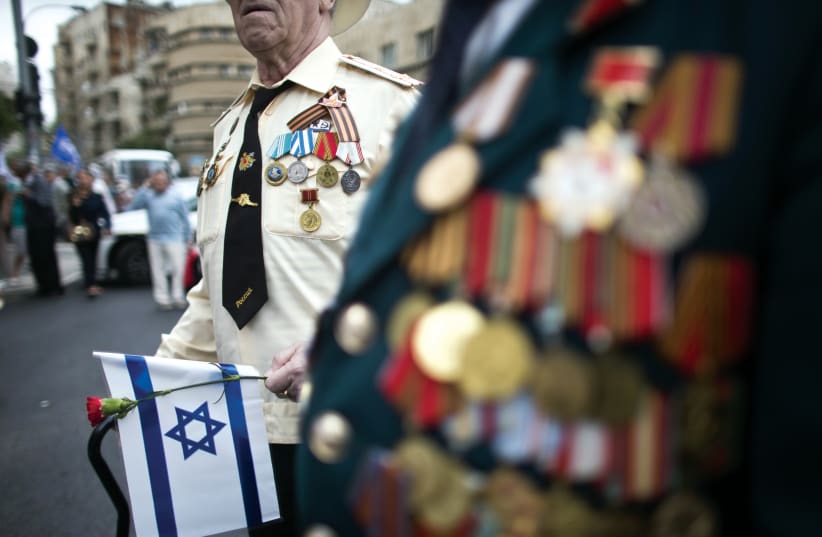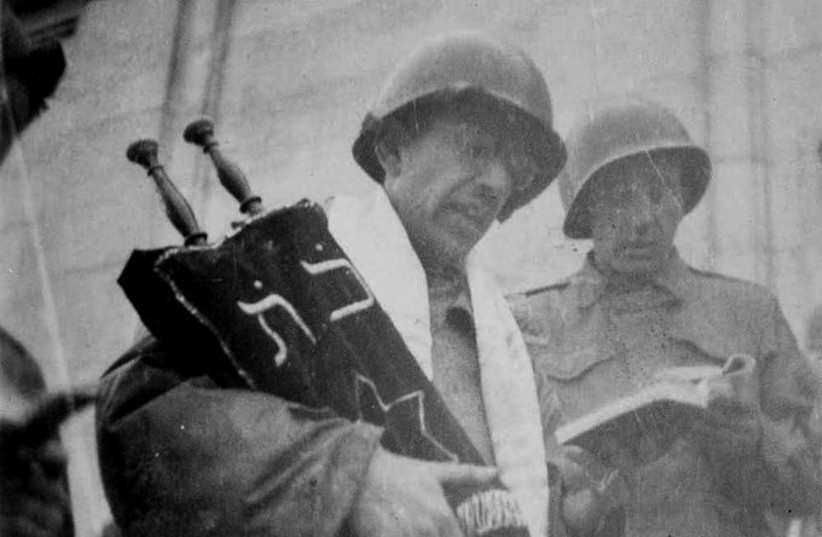How could a six-and-a-half-year old boy in Norfolk, Virginia, understand the tears in the eyes of his bubby, Frieda Birshtein, in May 1945 when she anguished so over the fate of her brother, Avraham Stavsky, and his family for whom she had searched through every source possible for five years to try and locate them in what is now Belarus. Ultimately, one niece, Rivka Czerniak, did survive and lived in the Jessie Cohen neighborhood of Holon.
How could this same little boy who so missed his dad, judge advocate Louis Geffen, know that his father’s military government unit in Camp Biel, Oakland, California, was being intensively prepped for the invasion of Japan, which President Truman was planning with his generals and admirals even as the UN was being created in San Francisco.
How could I know that my zayde, Rabbi Tobias Geffen in Atlanta, was arranging tefillot of Thanksgiving with the younger rabbi Hyman Friedman in the synagogue even as they received the news via the Agudas Harabbanim that six million Jews had been slaughtered by the Nazis, and that enormous sums were needed to rebuild the lives of the survivors.
I and my classmates could not really have known anything in our Henry Clay first grade classroom in Norfolk when that May 8, 1945, date was being approached in a matter-of-fact manner. “The news dispatches eased the public into V-E day,” The Virginian-Pilot reported a few weeks later at the end of the month. “This was deliberately intended to take the edge off any celebrations. There was the premature story on Saturday, May 4, so that the news gradually led Americans into it so that when V-E day dawned Tuesday, May 8, there was no surprise or sudden rush to celebrate.”
If that was a contemporary view back then, how could I have been prepared for that great moment – an event that changed the future of the entire planet?
President Harry Truman, only in office a few weeks following Roosevelt’s sudden death on April 12, was the mastermind of the V-E day triumph we now know. He was ready to involve American citizens in this pivotal drama so he issued this proclamation transforming May 12 and 13 into days of prayer.
“I call upon the people of the United States, whatever their faith, to unite in offering joyful thanks to God for the victory we have won, and to pray that He will support us to the end of our present struggle and guide us into the way of peace.”
President Harry Truman
“I call upon the people of the United States, whatever their faith, to unite in offering joyful thanks to God for the victory we have won, and to pray that He will support us to the end of our present struggle and guide us into the way of peace,” said Truman. “I also call upon my countrymen to dedicate the day of prayer to the memory of those who have given their lives to make possible our victory.”
At that time it was only known to the statistics bureau of the Jewish Welfare Board that 550,000 men and women, American Jewish citizens, had fought and were still fighting in World War II.
Eighty-seven years later, that little boy, now grown up and living in Jerusalem, wants to offer thanks for that victory. On Shabbat, May 12, 1945, all he recalls is receiving an American flag at Congregation Beth El in Norfolk; but since then I have learned more about the dedication and heroism of Jewish GI Joes and Janes.
On April 12, 1945, the day of Roosevelt’s death, American generals entered Buchenwald concentration camp with their troops. “General George Patton became physically ill and Dwight Eisenhower turned white when he saw the remaining Jewish survivors,” the AP story noted. “He immediately ordered all American units to enter and be witnesses.”
Nine days later, Nuremberg, the Nazi shrine city, fell, and Chaplain Max David Eichhorn of the US Army provided a most unusual report, which only came to light in 1946.
On Sunday, April 22, 1945, after the American military brought the battle of Nuremberg to an end, a great symbolic event occurred in the Zeppelin Stadium where Hitler, in the 1930s, had proclaimed the Nazi empire and the Nuremberg Race laws. As a participant, Chaplain David M. Eichhorn recorded the story for all future generations.
“I was joined in my jeep by Captain Bernard Weiss of the medical corps and Corporal Irving Levine of Chicago, my chaplain’s assistant, along with my US-issued portable Jewish field ark containing a Torah discovered in the ruins of the Hanonau France community. Also with us were five Palestinian Jewish soldiers who had been captives of the Nazis for four long bitter years. Behind us followed a second jeep, carrying five American Jewish soldiers of the 45th Division, men who had their share in the fighting that broke down the Nazi citadel.
“Slowly, we entered the stadium and drove as close as we could to the oft-photographed speaker’s rostrum surmounted by a resplendent gold-leafed swastika. Leaving our jeeps, my soldiers formed a guard of honor through which we carried the ark with us as we climbed to the spot where all the troops in the stadium could see us. I opened the ark and inside was a miniature Torah that had survived.”
That precious moment was highlighted in a Jewish fashion. Eichhorn announced proudly the victory of the American army over the Nazi forces. Then he offered a “tefilat shalom,” a prayer for peace in English. “When I completed that prayer, I and those with me loudly recited the sheheheyanu bracha, and I stressed how appreciative Americans and Jews were for this moment of victory. There was not a dry eye in the Nuremberg Zeppelin stadium.”
A US Army photographer snapped a picture showing Eichhorn and his men standing by the open ark with the giant swastika still behind them.
“Units of the 3rd infantry division that together with the 45th took the city were assembled in the stadium” for a special message and a momentous act. “The soldiers listened to the inspiring and determined words of Major General Wade H. Haislip, CO of the 15th Corps whose men took the city.”
Eichhorn recalled the general’s words: “We stand today amid the tumbled ruins of Nuremberg, amid the ruins of a city that gave its name to the infamous laws that violated every concept of human decency. Here Hitler reigned and strutted, and here he shouted at the multitude of adoring Germans who used to gather in propaganda-filled stupefaction. In this city, fascism flourished... We have conquered Nuremberg and we have destroyed it just as thoroughly as we shall destroy fascism and everything connected with it.”
Now Eichhorn described the final step on that April day 77 years ago.
“And then demolition charges were attached to the resplendent gold-leafed swastika atop the speaker’s platform. And it was blown sky-high.”
As I continued my personal search for the thoughts of the past, I found a poem focusing on peace, appropriately in the May 11, 1945, issue of the weekly American Hebrew, published in New York, only a few days after V-E day.
The Fair One Came
by Michael Gevins
Out of the smoking chaos, the crumblyEmbattlements of the earth, the fair one cameMeshed into the hushed throng,HumblyTheir hearts possessed her whispering her name.And there were men who looked upon her face,Saying: Peace wore the countenance of youth,Serenely beautiful, without a traceOf mortal hurt.And some, who knew the truth,Pitied the simple ones, for they had sweptBeneath the calm illusion, pushing underThe placid mask, remembering those slain...Your eyes are gentle, Peace, but they have keptPerilous tryst in valleys, torn asunderYour heart still holds the terror and the pain.
On that same day in Atlanta, the editorial in the local Anglo-Jewish newspaper, The Southern Israelite, was headlined “Ten Commandments Triumph.” “In the rantings and ravings of the Nazi publicists these last 12 years, one point was emphasized again and again. The Ten Commandments are meaningless; there is no God; let murder be used to provide strength; women are available for birthing a master race.”
Thankfully, that editorial seven decades and seven years ago could emphasize that “there is a God, every human being is precious and equal. Hitler and his Nazis did kill the innocent in a horrific fashion, but now they are dead. We pray that this first step toward peace will enable the survivors of war and those who helped them to survive rebuild a free world for all humanity.” ■

